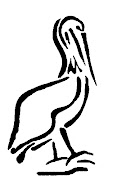But for the past two weekends I've been attending the Mariners School course led at the Nyack Boat Club, who has graciously allowed us to take over the clubhouse for three weekends.
Captain Keith is our instructor, and if nothing else, I'd like to approach his level of competence, grace, and good sense.
The first weekend which was denoted by spring-like weather (72 degrees and sunny), was devoted entirely to navigation. This includes buoyage, lights, and marks. A great proportion of that weekend was devoted to plotting - 3 point fixes, speed made good, set and drift, and so forth. Also, because all the problems' answers are given in true course (the outside ring of the compass rose), there are at least one conversion from ships compass course to true.
I've known since Boy Scouts that this conversion is necessary but have heard or read several different means of doing it. My reaction has been to just use the magnetic compass rose on the chart and assume my compass is spot on (which I know it isn't). Then I had LORAN, and then GPS, so I've had even less inclination to use this information. But here I am getting an OUPV license and needing to use it.
So for all of you who are dying to know, here it is: True Virgins Make Dull Company, Add Whiskey. Or, TV Makes Dull Children. This is what it means:
| W+ E- | True Course | Ever wonder why there's a 'true' ring on the compass rose? |
| Variation | The difference between True North and Magnetic North | |
| Magnetic Course | A corrected magnetic course | |
| Deviation | The difference between what the compass reads and what it should read | |
| W- E+ | Compass Course | What you read on the compass |
What this all means is that you add west, subtract east down and add east, subtract west going up. Easy, huh? More to the point, it's useful information to know.
But wait, there's more. Three bearing sights, estimated time of arrival, set and drift, little known facts about how channels are marked. Lots of information that apparently no small number of boaters don't know or understand.
I found it fun and interesting. Although I knew how to plot courses and so forth, I exclusively used the magnetic compass courses. Converting to true is easy, and more precise.
The second weekend, however, was not as much fun. Rules of the road, lights and sounds. I can guarantee most boaters have no idea what the rules actually are. They do one of two things: ignore them or misinterpret them. Sailboats do not always have the right of way, for instance.
Although the rules are well defined, you could use this rule of thumb, called 'The Rule Of Tonnage'. The bigger boat has the right of way. Just go with that.
The rules have some logic involved - it's easy to figure out who had rights over whom. Lighting, however, and shapes have no such logic. It's pure memorization. There doesn't seem to be anything to link them together. Oh, and Inland rules differ ever so slightly from International rules.
The Mariners School site has practice tests - thankfully the Coast Guard uses the multiple guess form of testing, so for the most part you can figure out the answer. We'll see when I take the test on January 29. In the meantime, I take their random question tests at least twice a day.
Other than the fact it's a lot like work, I really enjoy the school though. It's been over 30 years since I learned anything in a group setting. Although I can go much faster by myself the social part of the learning can't be overlooked. A good instructor is absolutely essential, and we have that in spades.
There are four general categories resulting in four tests - Rules of the Road, Navigation, Deck General, and Plotting.
Plotting is the most time consuming and a pencil width can change your answer enough to get it wrong. As easy as it is to perform on a large table in a brightly lit room in a yacht club, you could imagine how it would be plotting on a small, poorly lit surface at some moving angle other than horizontal. You can really appreciate electronics give that scenario! However, if there's anything Captain Keith has beaten into our collective brains, it's that even with electronics, you'd better keep track on your chart of where you are, especially if the weather is deteriorating.
It seems like common sense. However, as Voltaire said, "Common sense isn't so common." But that's a whole other post.
This weekend coming up is the final class - Besides plotting, we'll be going through Deck General, which contains safety, fire fighting, and survival basics.
It's cold now, so I'm not on the water, but I will be soon! Hope to see you there!


No comments:
Post a Comment